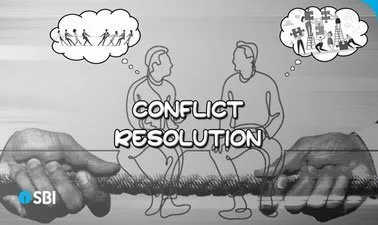
Conflict Transformation 
This course provides an introduction to conflict transformation, a process that seeks to create positive change from conflict. It covers the differences between conflict resolution, management, and prevention, and explores various tools and methods for engaging conflict in a constructive manner. ▼
ADVERTISEMENT
Course Feature
![]() Cost:
Cost:
Free
![]() Provider:
Provider:
Coursera
![]() Certificate:
Certificate:
Paid Certification
![]() Language:
Language:
English
![]() Start Date:
Start Date:
10th Jul, 2023
Course Overview
❗The content presented here is sourced directly from Coursera platform. For comprehensive course details, including enrollment information, simply click on the 'Go to class' link on our website.
Updated in [March 06th, 2023]
Aspect 1: Understanding Conflict Transformation. Learners will gain an understanding of the concept of conflict transformation and how it differs from conflict resolution, management, and prevention. They will learn how to identify and engage with conflict constructively, and how to use it as an opportunity for constructive change.
Aspect 2: Practical Techniques. Learners will gain practical techniques and transferable information to help them engage with conflict in their own lives. They will be provided with tips, handouts, demonstrations, and personalized assignments to help them bridge and enhance their own knowledge and history within the conflict narrative.
Aspect 3: Conflict Resolution. Learners will gain an understanding of the different tools and methods for resolving conflict. They will learn how to identify and address the underlying causes of conflict, and how to use communication and negotiation to resolve disputes.
Aspect 4: Conflict Management. Learners will gain an understanding of the different tools and methods for managing conflict. They will learn how to identify and address the underlying causes of conflict, and how to use communication and negotiation to manage disputes.
Aspect 5: Conflict Prevention. Learners will gain an understanding of the different tools and methods for preventing conflict. They will learn how to identify and address the underlying causes of conflict, and how to use communication and negotiation to prevent disputes.
[Applications]
Upon completion of this course, participants are encouraged to apply the concepts of conflict transformation to their own lives and work. They can use the tools and methods learned to engage in constructive dialogue and create positive change in their relationships and communities. Participants can also use the knowledge gained to help others in their own conflict transformation journey.
[Career Paths]
1. Conflict Resolution Specialist: Conflict resolution specialists are responsible for helping to resolve disputes between individuals, groups, or organizations. They use a variety of techniques, such as mediation, negotiation, and arbitration, to help parties reach a mutually beneficial agreement. Conflict resolution specialists are in high demand as the need for effective dispute resolution continues to grow.
2. Conflict Management Consultant: Conflict management consultants help organizations identify and address potential sources of conflict. They work with clients to develop strategies for managing and resolving conflicts, as well as to create policies and procedures to prevent future conflicts. Conflict management consultants are in high demand as organizations strive to create a more harmonious workplace.
3. Conflict Prevention Specialist: Conflict prevention specialists work to identify and address potential sources of conflict before they become a problem. They use a variety of techniques, such as education, training, and research, to help organizations and individuals prevent and manage conflicts. Conflict prevention specialists are in high demand as organizations strive to create a more peaceful and productive environment.
4. Conflict Transformation Trainer: Conflict transformation trainers help individuals and organizations learn how to transform conflicts into opportunities for growth and development. They use a variety of techniques, such as role-playing, simulations, and group activities, to help participants understand the dynamics of conflict and how to use it to their advantage. Conflict transformation trainers are in high demand as organizations strive to create a more collaborative and productive environment.
[Education Paths]
1. Bachelor's Degree in Conflict Resolution: A Bachelor's Degree in Conflict Resolution is a great way to gain a comprehensive understanding of the principles and practices of conflict resolution. This degree program typically covers topics such as negotiation, mediation, communication, and dispute resolution. It also provides students with the opportunity to develop their skills in problem-solving, critical thinking, and decision-making. With the increasing demand for conflict resolution professionals, this degree path is becoming increasingly popular and is expected to continue to grow in the coming years.
2. Master's Degree in Conflict Transformation: A Master's Degree in Conflict Transformation is a great way to gain a deeper understanding of the principles and practices of conflict transformation. This degree program typically covers topics such as conflict analysis, power dynamics, and the use of nonviolent strategies. It also provides students with the opportunity to develop their skills in research, critical thinking, and communication. With the increasing demand for conflict transformation professionals, this degree path is becoming increasingly popular and is expected to continue to grow in the coming years.
3. Doctorate Degree in Conflict Studies: A Doctorate Degree in Conflict Studies is a great way to gain an in-depth understanding of the principles and practices of conflict studies. This degree program typically covers topics such as international relations, human rights, and peacebuilding. It also provides students with the opportunity to develop their skills in research, critical thinking, and communication. With the increasing demand for conflict studies professionals, this degree path is becoming increasingly popular and is expected to continue to grow in the coming years.
4. Certificate in Conflict Transformation: A Certificate in Conflict Transformation is a great way to gain a basic understanding of the principles and practices of conflict transformation. This certificate program typically covers topics such as conflict analysis, power dynamics, and the use of nonviolent strategies. It also provides students with the opportunity to develop their skills in problem-solving, critical thinking, and decision-making. With the increasing demand for conflict transformation professionals, this certificate path is becoming increasingly popular and is expected to continue to grow in the coming years.
Pros & Cons

Relevant and challenging readings

Knowledgeable and clear lecturer

Balanced video material, activities and reading materials

Assignments require reading to understand

Time indications for readings often too low

Forum feels a little dead

No moderator interaction with student responses

Time needed to read and annotate texts often double indicated time
Course Provider

Provider Coursera's Stats at AZClass
Discussion and Reviews
0.0 (Based on 0 reviews)
Explore Similar Online Courses

Introduction to Caligrafy - Your PHP Framework

Leading Transformative Change in Education

Python for Informatics: Exploring Information

Social Network Analysis

Introduction to Systematic Review and Meta-Analysis

The Analytics Edge

DCO042 - Python For Informatics

Causal Diagrams: Draw Your Assumptions Before Your Conclusions

Whole genome sequencing of bacterial genomes - tools and applications

Introduction to Conflict Management

Conflict Resolution

Mediation and Conflict Resolution
 Related Categories
Related Categories
 Popular Providers
Popular Providers
Quiz
 Submitted Sucessfully
Submitted Sucessfully
1. What is the duration of the course?
2. What is the main focus of the course?
3. What type of information will be provided in the course?


Start your review of Conflict Transformation